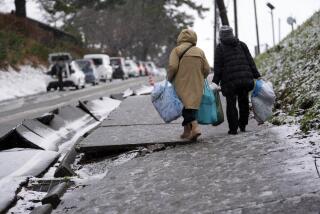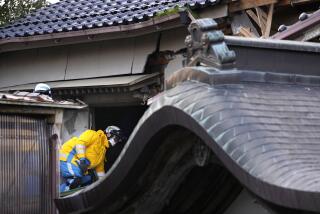Displaced by disaster, Japanese contend with the big city
It’s not that Miyoko Baba’s 11-year-old son, Ryu, is a bad student. Back home in Iwaki, about 20 miles south of the Fukushima nuclear power plant, he got decent marks. But with the family having fled their house for Tokyo, she’s worried about how her fifth-grader will measure up to his new classmates in the big city.
“There’s a big difference between the level of kids in Iwaki and kids in Tokyo,” said Baba, a broad-faced woman of 51 with a raspy voice whose husband is a trucker who hauls seafood. “You can be a star student back at home, but come to Tokyo and you’re middle of the road.
“Outside the big cities, school isn’t as important as taking over the family business,” she said. “In Tokyo, everyone studies in the summer. Where we live, everyone just relaxes.”
More than a month has passed since a giant earthquake and tsunami devastated a large swath of northeastern Japan and touched off a crisis at the nuclear power plant. After weeks in makeshift shelters, tens of thousands of people are beginning to make the transition into more stable, if not permanent, living quarters, many far from their hometowns, in bigger cities where the pace of life is uncomfortably fast, the cost of living is distressingly high, the skills for jobs agonizingly unfamiliar.
Tokyo placed at least 600 evacuated families, many from Fukushima prefecture, in public housing and hundreds more in a recently closed luxury hotel. The Ministry of Land, Infrastructure, Transport and Tourism said 2,645 tract homes had been built as of April 1, and that an additional 30,000 would be completed within two months. Some evacuees have moved in with relatives or friends, or rented apartments on their own.
In some towns, such as Rikuzentakata, hundreds of evacuees have voted to relocate en masse to neighboring municipalities in an effort to keep their communities intact. The bond that many Japanese, particularly older people, feel with their hometowns is profound; it’s not uncommon for families to be able to trace their lineage in their village back hundreds of years. Being forced to leave one’s furusato, even temporarily, can leave a deep emotional wound.
But a new academic year began April 6, and many families have moved far away so their children could start school on time. An Asahi newspaper tally published the April 7 showed that about 7,000 students had already sought transfers outside their home prefectures, with many going to nearby Niigata, to the west.
A survey of nearly 500 displaced people in the three hardest-hit prefectures by national broadcaster NHK several weeks after the disaster found that of nearly 80% who wanted to return to their hometowns, about half thought they would not be able to. Twenty percent of those surveyed said they didn’t want to go back because they feared another disaster, didn’t want to relive bad memories or worried about not having enough money.
Baba’s friend Hiromi Soeta, a 50-year-old from the town of Shirakawa in Fukushima, will be moving into city-run housing in Tokyo’s Adachi ward. Her family won’t have to pay rent for six months, and the city government will provide futons, a TV, a refrigerator and a washing machine. Still, she frets about paying for the utilities, and even little things like laundry.
“Tokyo is expensive,” said Soeta, the mother of a 7-year-old, a 21-year-old and 28-year-old twins. “It’s not like in the countryside, where you can do an entire load for $2. It’s $5. But we don’t have that kind of money. So instead we just wear the same clothes many days in a row. And if it gets too bad, we just wash it in the bath.”
Tetsuo Iizuka, Shinya Kanno and Kazumasa Saito, three 27-year-olds from Fukushima, have no idea of what kind of work they can do in Tokyo. Friends since kindergarten, they followed in their fathers’ footsteps and became fishermen right out of high school.
They were accustomed to getting up at 2 a.m. and heading for the harbor. Usually, they’d stay at sea for two or three days, using big nets to catch fish, crab and shrimp.
Now they’re camped out at Tokyo’s Big Sight convention center, a cavernous concrete building where the fluorescent lights come on at 7 a.m. and go out at 10 p.m. There’s not a window in sight of their cubicle through which they might catch a scent of a salty sea breeze. They are whiling away the days.
“Our beer money will run out soon, we need to get jobs, but what can we do?” Iizuka said. “We will have no choice but to get adapted to Tokyo life, but I don’t know how it can happen.”
They’ve applied for public housing, but even if they are accepted, they won’t invite their families, sheltering elsewhere in Fukushima, to join them. “Tokyo people are cold,” Kanno said. “They wouldn’t like it here.”
Marivic Takakuwa, who like Baba left Iwaki for Tokyo and is also staying at Big Sight, has noticed too that people in Tokyo are brusque and often in a rush. Since coming to the capital, she’s started checking the clock constantly.
Part of the change, said the mother of six, is getting used to taking public transportation. Back in Iwaki, she would simply pile her six kids into her minivan and drive them to piano, tennis and martial-arts classes in a matter of minutes.
But with her English-teaching job on hiatus and money getting tight, she fears getting a parking ticket in Tokyo, where fines can run $500. She recently took her 13-year-old daughter, Miho, to play tennis. They walked to a train, then rode for 30 minutes, then walked some more. One way, the trip took more than an hour.
“It’s not like Iwaki, where if you want to go for a walk, you go for a walk, and if you need to drive, you drive,” she said. “Here, you have to walk, and everything takes a lot of time.”
Takakuwa and her husband this month made the difficult decision to enroll Miho, plus their three youngest children, ages 7, 9 and 10, in a Tokyo boarding school that has opened its doors to displaced families. The children will have to stay there during the week, and see their parents only on weekends.
“In my life, it will be the first time to be away from them like this,” said Takakuwa, who came to Japan about 20 years ago from the Philippines. “I feel so lonely about it, but I am trying not to think too much about it.”
She misses the nature in Iwaki, and the more relaxed pace of life. They will manage in Tokyo somehow, she said, but it’s hard to feel as if they will ever fit in.
“My daughter complains that she doesn’t like Tokyo,” Takakuwa said, though it is clear that she shares some of the same sentiments. “She says, ‘Mom, I don’t care about being a country bumpkin. I like where we are from.’”
Hall is a special correspondent.
More to Read
Start your day right
Sign up for Essential California for news, features and recommendations from the L.A. Times and beyond in your inbox six days a week.
You may occasionally receive promotional content from the Los Angeles Times.







